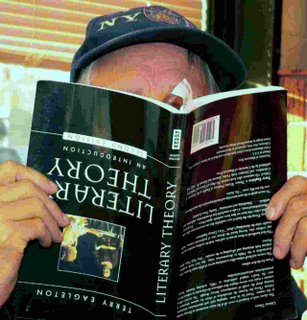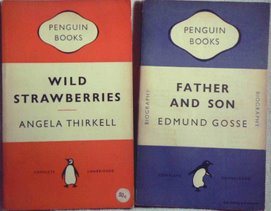Semiology 'Runs' to Catch Up with the Internet : On Book Power
"About Umberto Eco"
------------------ Also quotes from a 2002 article
in The Guardian,
Saturday October 12, 2002
"Signs of the times"
by Maya Jaggi
When the former hotel building in Milan where Umberto Eco lives was converted into flats, he preserved the winding corridors as a labyrinthine library, housing some 30,000 volumes. The shrine to learning seems apt for the creator of the 14th-century monastery in The Name of the Rose (1980), the medieval murder mystery that combined metaphysics, theology and the enigma of Aristotle's "lost" tome on comedy, with poisoned monks and the twists of a Sherlock Holmes whodunnit - a "book built of books".
His paternal grandfather was a bookbinder and "socialist typographer who organised strikes". During the second world war it was one of Eco's duties to go down to the cellar with a candle and pick up the charcoal: "I spent hours opening the old books and forgetting the coal." Among books he found were works by Jules Verne and Marco Polo, and included Darwin's The Origin of Species** and piles of adventure comics. His maternal grandmother, barely schooled but a "compulsive reader" who subscribed to a mobile library, stoked this eclectic passion. "She had no real cultural discrimination: she could read dime novels as well as Dostoyevsky and Balzac."
** ( - - Note by Bogaulaire: and "The Voyage of the Beagle" was what U. E. liked most about the book . . I'll bet.)
---------
.

Photo of Umberto Eco by Robert Birnbaum
In 1978 . . Eco's career took a dramatic new turn. At a friend's invitation, he decided to write a detective story . . .
. . . He also decided to make it a demonstration of his own literary theories of an "open text" that would provide the reader with almost infinite possibilities for interpretation in the signs and clues the protagonist must decode in order to solve a mystery.
Set in a fourteenth-century monastery, The Name of the Rose is the story of a monk who tries to solve several murders while struggling to defend his quest for the truth against church officials. A main theme of the novel is Eco's own
love of books, and the solution to the murders ultimately lies in coded manuscripts and secret clues in the abbey's library. Dense with learned references and untranslated Latin, it is both an exhaustively detailed murder mystery and Eco's semiotic metaphor for the reader's own quest to derive meaning on many levels from the signs in a work of art. Its publishers expected to sell no more than 30,000 copies, but the novel became an international bestseller. In 1986 it was made into a film starring Sean Connery and Christian Slater.
. . .
In recent years Eco has become increasingly involved in debates of how electronic media and computer technologies will affect culture and society. At the International Center for Semiotic and Cognitive Science in San Marino in 1994, he organized a seminar on the future of the book that attracted hypermedia experts from around the world. His own observations on the Internet, virtual reality, and hypertext have appeared in Encyclomedia, a CD-ROM history of philosophy that he helped to develop. Recently he has become involved with the Multimedia Arcade, a complex in Bologna offering Internet access, a computer training center, and a public multimedia library.
. . .
"We are marching toward a more liberated society in which free creativity will co-exist with textual interpretation," he said, but we will need a "new form of critical competence … "a new kind of educational training, a new wisdom" to cope with the sheer quantity of information.
. . .
 Writing in The Nation, he asserted that "books still represent the most economical, flexible, wash-and-wear way to transport information at very low cost." Books will remain essential not only for literature but for "any circumstance in which one needs to read carefully, not only to receive information but also to speculate and reflect about it." In his opinion, a device which allows us to invent new texts has nothing to do with our ability to interpret pre-existing texts.
Writing in The Nation, he asserted that "books still represent the most economical, flexible, wash-and-wear way to transport information at very low cost." Books will remain essential not only for literature but for "any circumstance in which one needs to read carefully, not only to receive information but also to speculate and reflect about it." In his opinion, a device which allows us to invent new texts has nothing to do with our ability to interpret pre-existing texts.. . .
Eco is an avid book collector who has apartments in Milan, Bologna, and Paris, as well as a summer home near Rimini. In addition to running the Program for Communication Sciences at the University of Bologna, he travels frequently to speak and teach. He continues to publish scholarly treatises, which number almost two dozen, and to contribute to several foreign and Italian newspapers.
. . .
See Wikipedia Article HERE.



No comments:
Post a Comment